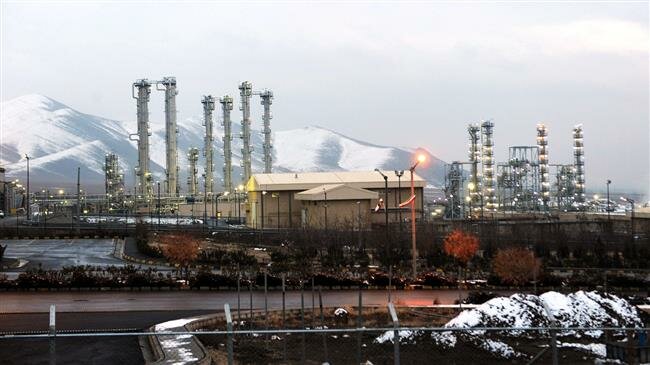TEHRAN, Jul 8 - The International Atomic Energy Agency (IAEA) has issued a report confirming an earlier announcement by the spokesman for the Atomic Energy Organization of Iran (AEOI), Behrouz Kamalvandi, that Tehran has passed the 3.67% uranium enrichment cap set by a 2015 nuclear deal and reached about 4.5%.
 TEHRAN, Young Journalists Club (YJC) - On Monday morning, Kamalvandi broke the news warning that the country's next step in reducing commitments under the 2015 nuclear deal will be stronger.
TEHRAN, Young Journalists Club (YJC) - On Monday morning, Kamalvandi broke the news warning that the country's next step in reducing commitments under the 2015 nuclear deal will be stronger.
"Twenty percent is not needed now, but if we want, we will produce it. When we've put aside 3.67% enrichment, we have no obstacle or problem with this action," he added.
Kamalvandi said the European signatories to the nuclear deal should act quickly to fulfill their promises because Iran will continue reducing its commitments to the agreement until it achieves a result.
Later on Monday, the IAEA released its report on the development, corroborating that Iran has enriched uranium beyond a 3.67% purity limit set by the nuclear deal with world powers, officially known as the Joint Comprehensive Plan of Action (JCPOA).
"(International Atomic Energy Agency) Director General Yukiya Amano has informed the IAEA Board of Governors that Agency inspectors on 8 July verified that Iran is enriching uranium above 3.67% U-235," an IAEA spokesman was quoted by Reuters as saying, referring to the fissile uranium-235 isotope.
Also an IAEA report to member states obtained by Reuters said the agency had verified the enrichment level using online enrichment monitors, and samples had also been taken on Monday for analysis.
Although the agency’s report did not say exactly what purity level Iran was enriching at and only noting that it was above the 3.67% limit, it added that Iran had informed the agency the same day that "based on the operator's assessment" the enrichment level was about 4.5%.
Iran must be persuaded to stick to JCPOA: Germany
Meanwhile, Germany, which is one of the five remaining signatories to the Iran nuclear deal, said on Monday that Tehran must be persuaded to stick to its commitments as per the JCPOA.
"The ball is clearly in Iran's court. We want to preserve the deal. For this, parties must stick to it," a spokesman for the German Foreign Ministry told a regular government news conference in Berlin on Monday.
Asked at which point a red line would be crossed for the German government, the spokesman said, "Our objective is that Iran abides by the deal," adding that Tehran needs to reverse all steps that contradict the nuclear agreement.
In May 2018, US President Donald Trump withdrew Washington from the JCPOA, reached in July 2015 between Iran and the P5+1 group of countries -- the United States, Britain, France, Russia and China plus Germany -- and decided to re-impose unilateral sanctions against Tehran.
Under the JCPOA, Iran undertook to put limits on its nuclear program in exchange for the removal of nuclear-related sanctions.
On the first anniversary of the US withdrawal from the nuclear deal, Iran announced that it would suspend the implementation of some of its commitments under the deal, announcing that it would stop exporting excess uranium and heavy water, setting a 60-day deadline for the five remaining parties to the deal to take practical measures towards ensuring its interests in the face of the American sanctions.
Following Washington’s exit from the deal, the Europeans pledged to keep the historic agreement alive but Iran has criticized them for failing to fulfill their obligations under the accord.
Russia concerned but continues dialogue
Russia, another signatory to the 2015 Iran deal, expressed concerns about Tehran’s increasing the uranium enrichment cap, with Kremlin spokesman Dimitry Peskov saying that Russia "aims to continue dialogue” and pursue diplomatic methods.
"The situation is of course concerning," Peskov told journalists. "Russia aims to continue dialogue and efforts on the diplomatic front. We are still supporters of the JCPOA.”
Peskov added that the announcement by Iran was one of the "consequences" of the US abandoning the landmark accord.
"Russia and President (Vladimir) Putin warned of the consequences that would be imminent after one of the countries decided to end its obligations and exit the deal," the Kremlin spokesman said.
Blame on US bullying
Moreover, China pointed the finger of blame at the US, accusing Washington of bullying Tehran.
"The facts show that unilateral bullying has already became a worsening tumor," Chinese Foreign Ministry spokesman Geng Shuang said in Beijing on Monday.
He blamed the US’s “maximum pressure” on Iran for latest developments revolving the Iranian nuclear program.
Extreme concern in Europe
The European Union said it was "extremely concerned" by Iranian plans to exceed the uranium enrichment cap set by the JCPOA, calling on Tehran to "stop and reverse" any actions that went against the nuclear deal.
"We strongly urge Iran to stop and reverse all activities that are inconsistent with the commitments made under the JCPOA," EU spokeswoman Maja Kocijancic told reporters.
"We are extremely concerned by the announcement made over the weekend by Iran regarding the start of the uranium enrichment above the limit of 3.7 percent," Kocijancic added.
The bloc said it would await a report from the UN nuclear agency and consult other signatories to the deal before deciding on future steps.
Source: Press TV
 TEHRAN,
TEHRAN,